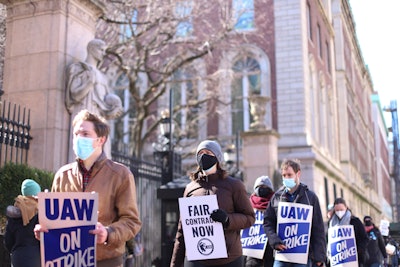Tensions in the ongoing student workers’ strike at Columbia University were inflamed further this week by the leak of two emails in which Columbia administrators advertised spring teaching and assistant jobs to graduate students at New York University.
The messages, which were posted on the Twitter account of the NYU Graduate Student Organizing Committee (NYU-GSOC), came in the wake of an email to strikers from Columbia’s human resources department saying that only those who resumed work by December 10th would be guaranteed job appointments in the spring. The Student Workers of Columbia (SWC) interpreted the email as an illegal threat to permanently replace striking workers and has filed an Unfair Labor Practices claim with the National Labor Relations Board.
THE SWC believes that one of the emails, which was seeking teaching assistants for an art history course, is a misunderstanding, according to Tristan Du Puy, a PhD candidate in sustainable development and a member of the SWC’s bargaining committee. However, the union thinks that the other message, a solicitation for a French lecturer, is problematic.
“It’s definitely looking for scabs,” said Du Puy.
In response to the emails, the NYU-GSOC created an online petition condemning Columbia’s “aggressive and illegal anti-strike measures,” and pledging to not take any job replacing the work of a striking Columbia student. By Thursday, it had over 450 signatures from local academic workers.
Dr. Pascale Hubert-Liebler, director of the French language program at Columbia, said that the union’s interpretation of the email was wrong.
“We are not hiring instructors to replace any striking graduate students, but simply because we do not have enough graduate students and lecturers to cover all our sections.” she said.
The union remains skeptical.
“I think what’s most likely is that it’s not actually hiring someone to replace people from the French department, but [that] it’s new appointments to make up for work that was not accomplished during the strike,” said Du Puy. “Students who couldn’t really learn as much as they would usually get these extra classes taught by new instructors.”
“It’s a manner of adhering to the request to not replace someone’s labor while also circumventing it at the same time,” said Andre Pettman, a PhD candidate in French literature who is on strike.
Hubert-Leibler denies this claim.
“It is just regular hiring,” she said. “I find myself in this situation almost every semester.”
But Pettman finds this hard to believe in light of the letter from human resources.
“I would say that [it] would read very differently if I knew, for example, that I and anyone else in my department on strike would be guaranteed their appointment for the spring,” he said. “Then I would [think], ‘Oh, there must be high enrollment figures or they’re just offering other sections for students who don’t feel comfortable moving on to the next [level] of the language.’ But when I have no idea come January if I'll be teaching a course and getting paid for doing so, then the email makes me at the very least uncomfortable.”
As the fall semester ends, negotiations between the SWC and the university continue. But after striking for seven weeks and counting, the union may not have much trust left.















